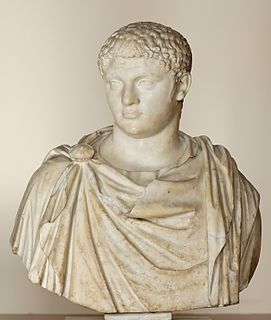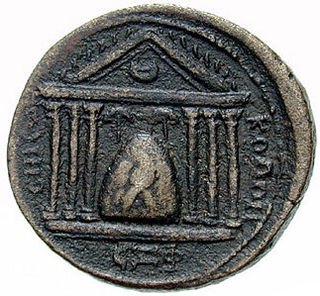
Lucius Septimius Severus was a Roman emperor from 193 to 211. He was born in Leptis Magna in the Roman province of Africa. As a young man he advanced through the customary succession of offices under the reigns of Marcus Aurelius and Commodus. Severus seized power after the death of Emperor Pertinax in 193 during the Year of the Five Emperors.
The 200s decade ran from January 1, 200, to December 31, 209.
The 210s decade ran from January 1, 210, to December 31, 219.
Year 203 (CCIII) was a common year starting on Saturday of the Julian calendar. At the time, it was known as the Year of the Consulship of Plautianus and Geta. The denomination 203 for this year has been used since the early medieval period, when the Anno Domini calendar era became the prevalent method in Europe for naming years.
Year 198 (CXCVIII) was a common year starting on Sunday of the Julian calendar. At the time, it was known as the Year of the Consulship of Sergius and Gallus. The denomination 198 for this year has been used since the early medieval period, when the Anno Domini calendar era became the prevalent method in Europe for naming years.

Year 208 (CCVIII) was a leap year starting on Friday of the Julian calendar. At the time, it was known as the Year of the Consulship of Aurelius and Geta. The denomination 208 for this year has been used since the early medieval period, when the Anno Domini calendar era became the prevalent method in Europe for naming years.
Year 209 (CCIX) was a common year starting on Sunday of the Julian calendar. At the time, it was known as the Year of the Consulship of Commodus and Lollianus. The denomination 209 for this year has been used since the early medieval period, when the Anno Domini calendar era became the prevalent method in Europe for naming years.
Year 211 (CCXI) was a common year starting on Tuesday of the Julian calendar. At the time, in the Roman Empire it was known as the Year of the Consulship of Terentius and Bassus. The denomination 211 for this year has been used since the early medieval period, when the Anno Domini calendar era became the prevalent method in Europe for naming years.
Year 212 (CCXII) was a leap year starting on Wednesday of the Julian calendar. At the time, it was known as the Year of the Consulship of Asper and Camilius. The denomination 212 for this year has been used since the early medieval period, when the Anno Domini calendar era became the prevalent method in Europe for naming years.
Sextus Varius Marcellus was a Roman aristocrat and politician from the province of Syria.

Geta was Roman emperor with his father Septimius Severus and older brother Caracalla from 209, when he was named Augustus like his brother, who had held the title since 198. Severus died in 211, and although he intended for his sons to rule together, they proved incapable of sharing power, culminating with the murder of Geta in December of that year.

The Severan Bridge is a late Roman bridge located near the ancient city of Arsameia, 55 km (34 mi) north east of Adıyaman in southeastern Turkey. It spans the Cendere Çayı, a tributary of Kâhta Creek, on provincial road 02-03 from Kâhta to Sincik in Adıyaman Province. This bridge was described and pictured in 1883 by archeologists Osman Hamdi Bey and Osgan Efendi.

The Arch of Septimius Severus at the northwest end of the Roman Forum is a white marble triumphal arch dedicated in 203 to commemorate the Parthian victories of Emperor Septimius Severus and his two sons, Caracalla and Geta, in the two campaigns against the Parthians of 194/195 and 197–199.
Lucius Alfenus Senecio was a Roman figure of the late 2nd and early 3rd centuries.

Gaius or Lucius Fulvius Plautianus was a member of the Roman gens Fulvia. Like Sejanus, Perennis and Cleande, as head of the Praetorian Guard, he was formally extraordinary powerful and influential in the administration of state affairs, and was involved with Julia Domna, the powerful wife of Septimius Severus, who played a prominent public and political role, in influencing the emperor's decisions.

Gaius Julius Bassianus or Bassus, also known as Julius Bassianus was an Arab high priest of Elagabalus at the Temple of the Sun in Emesa, Syria, where this solar deity was worshipped in a shape of a black stone. The name Elagabalus derives from Ilāh and gabal, resulting in "the God of the Mountain," the Emesene manifestation of the deity. Bassianus was a member of the Royal family of Emesa, which was a part of the Arab aristocracy in this client kingdom of the Roman Empire. The beginning of his priesthood is unknown, but by 187 he was a high priest at Emesa. Bassianus was a son of a Julius and his paternal uncle was Julius Agrippa, who served as a Primipilaris.
Marcus Julius Gessius Marcianus also known as Gessius Marcianus was a Syrian Roman aristocrat.
Publius Septimius Geta was the father of the emperor Lucius Septimius Severus, father-in-law of the powerful Roman empress Julia Domna and the paternal grandfather of l Roman emperors Caracalla and Geta. Besides mentions in the Historia Augusta, Geta is known from several inscriptions, two of which were found in Leptis Magna, Africa.
Publius Septimius Geta was the second son to the elder Publius Septimius Geta and brother of the emperor Septimius Severus. His mother was Fulvia Pia. He was born and raised in Leptis Magna. Geta was of Berber, Libyco-Punic and Roman ancestry.
The gens Septimia was a minor plebeian family at Rome. The gens first appears in history towards the close of the Republic, and they did not achieve much importance until the latter half of the second century, when Lucius Septimius Severus obtained the imperial dignity.






